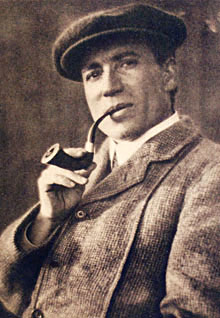W H Davies
3 July 1871 – 26 September 1940
William Henry Davies was a Welsh poet and writer. Davies spent a significant part of his life as a tramp or vagabond in the United States and United Kingdom, but became known as one of the most popular poets of his time. The principal themes in his work are the marvels of nature, observations about life’s hardships, his own tramping adventures and the various characters he met.
The son of an iron moulder, Davies was born at 6, Portland Street in the Pillgwenlly district of Newport, Wales. He had an elder brother, Francis Gomer Boase (who was considered ‘slow’) and in 1874 his younger sister Matilda was born and in November 1874 his father died.
Davies was a difficult and somewhat delinquent young man, and made repeated requests to his grandmother to lend him the money to sail to America. When these were all refused, he eventually left Newport, took casual work and started to travel. The Autobiography of a Super-Tramp, published in 1908, covers his life in the USA between 1893 and 1899, and includes many adventures and characters from his travels as a drifter. During this period he crossed the Atlantic at least seven times working on cattle ships. He travelled through many of the States, sometimes begging, sometimes taking seasonal work, but often ending up spending any savings on a drinking spree with a fellow traveller.
The turning point in Davies’s life came when he read in England of the riches to be made in the Klondike and immediately set off to make his fortune in Canada. Attempting to jump a freight train at Renfrew, Ontario with fellow tramp Three-fingered Jack, he lost his footing and his right foot was crushed under the wheels of the train. The leg later had to be amputated below the knee and he wore a wooden leg thereafter. Davies’s biographers have agreed that the significance of the accident should not be underestimated, even though Davies himself played down the story. Davies himself wrote of the accident:
I bore this accident with an outward fortitude that was far from the true state of my feelings. Thinking of my present helplessness caused me many a bitter moment, but I managed to impress all comers with a false indifference… I was soon home again, having been away less than four months; but all the wildness had been taken out of me, and my adventures after this were not of my own seeking, but the result of circumstances.
On 12 October 1905 Davies met Edward Thomas, then literary critic for the Daily Chronicle in London, who was to do more to help him than anyone else. Thomas rented a tiny two-roomed cottage for Davies near Sevenoaks in Kent which was only two meadows off from Thomas’s own house. Thomas adopted the role of protective guardian for Davies, on one occasion even arranging for the manufacture, by a local wheelwright, of a makeshift replacement wooden leg.
In 1907, the manuscript of The Autobiography of a Super-Tramp drew the attention of George Bernard Shaw, who agreed to write a preface. In his poetry Davies drew extensively for material on his experiences with the seamier side of life, but also on his love of nature. He is generally best known for the opening two lines of the poem Leisure, first published in Songs Of Joy and Others in 1911:
What is this life if, full of care
We have no time to stand and stare…
Somewhat surprisingly, his great friend and mentor, Edward Thomas, likened Davies to Wordsworth, writing:
He can write commonplace or inaccurate English, but it is also natural to him to write, such as Wordsworth wrote, with the clearness, compactness and felicity which make a man think with shame how unworthily, through natural stupidity or uncertainty, he manages his native tongue. In subtlety he abounds, and where else today shall we find simplicity like this?
A large collection of Davies manuscripts, including a copy of Lesiure, dated 8 May 1914, is held by the National Library of Wales.


